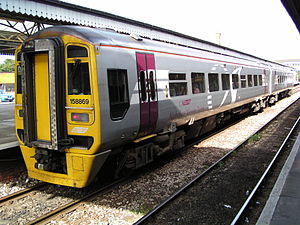Wessex Trains: Difference between revisions
→Rolling stock: each instance of the word "Class" in the Class column is superfluous (except the heading, of course) |
→Rolling stock: satisfied MOS:DATERANGE |
||
| Line 80: | Line 80: | ||
| rowspan="3" |120 |
| rowspan="3" |120 |
||
|8 (one scrapped due to fire at {{stnlnk|Flax Bourton}} fleet reduced to 7) |
|8 (one scrapped due to fire at {{stnlnk|Flax Bourton}} fleet reduced to 7) |
||
|1985–1986 |
|||
|1985–86 |
|||
|- |
|- |
||
|[[British Rail Class 150|150 ''Sprinter'']] |
|[[British Rail Class 150|150 ''Sprinter'']] |
||
|[[File:150246 at Plymouth.JPG|100px]] |
|[[File:150246 at Plymouth.JPG|100px]] |
||
|25 |
|25 |
||
|1984–1987 |
|||
|1984–87 |
|||
|- |
|- |
||
|[[British Rail Class 153|153 ''Super Sprinter'']] |
|[[British Rail Class 153|153 ''Super Sprinter'']] |
||
|[[File:Wessex Trains DMU 153318.jpg|100px]] |
|[[File:Wessex Trains DMU 153318.jpg|100px]] |
||
|13 |
|13 |
||
|1987–1988 |
|||
|1987–88 |
|||
|- |
|- |
||
|[[British Rail Class 158|158 ''Express Sprinter'']] |
|[[British Rail Class 158|158 ''Express Sprinter'']] |
||
| Line 97: | Line 97: | ||
|145 |
|145 |
||
|12 |
|12 |
||
|1989–1992 |
|||
|1989–92 |
|||
|- |
|- |
||
|[[British Rail Mark 2|Mark 2 carriage]] |
|[[British Rail Mark 2|Mark 2 carriage]] |
||
| Line 105: | Line 105: | ||
|160 |
|160 |
||
|5 |
|5 |
||
|1969–1975 |
|||
|1969–75 |
|||
|} |
|} |
||
Revision as of 15:53, 14 August 2021
 Class 158 Express Sprinter at Truro in 2003 | |
| Overview | |
|---|---|
| Franchise(s) | Wessex 14 October 2001 – 31 March 2006 |
| Main region(s) | South West England |
| Other region(s) | South East England, South Wales |
| Fleet size | 70 |
| Stations called at | 161 |
| Stations operated | 125 |
| Parent company | National Express |
| Reporting mark | WE |
| Successor | First Great Western |



Wessex Trains[1] was a train operating company in the United Kingdom owned by National Express that operated the Wessex Trains franchise from October 2001 until March 2006, when the franchise was merged with the Great Western and Thames Valley franchises to form the Greater Western franchise.
History
In October 1996, Wales & West commenced operating the South West & Wales franchise in Wales and the West Country. It also operated services to Liverpool Lime Street, Manchester Piccadilly, Birmingham International, Southampton Central, Brighton and London Waterloo.
In 2001 the Strategic Rail Authority decided to re-organise the Valley Lines and Wales & West franchises, both being operated by National Express. Wales & West became Wessex Trains from October 2001.
Wessex Trains retained the West Country services with the Welsh services transferred to Wales & Borders although Wessex Trains operated services to Cardiff.
Services
Wessex Trains ran the majority of local trains in the South West as seen in their route map.[2]
Services ran from Great Malvern and Cardiff to Brighton, Portsmouth, Weymouth and Penzance and on these secondary lines:
- Atlantic Coast Line (Par - Newquay)
- Avocet Line (Exeter - Exmouth)
- Golden Valley Line (Swindon - Gloucester)
- Heart of Wessex Line (Westbury - Weymouth)
- Looe Valley Line (Liskeard - Looe)
- Maritime Line (Truro - Falmouth)
- Riviera Line (Exeter - Paignton)
- Severn Beach Line (Bristol - Avonmouth - Severn Beach)
- St Ives Bay Line (St Erth - St Ives)
- Tamar Valley Line (Plymouth - Gunnislake)
- Tarka Line (Exeter - Barnstaple)
Rolling stock
Wessex Trains inherited a fleet of Class 143, Class 150, Class 153 and Class 158s from Wales & West.
Wessex Trains leased Class 31s from Fragonset to haul a set of Mark 2 carriages from 2002 on services from Cardiff and Bristol Temple Meads to Brighton and Weymouth.[3]
| Class | Image | Type | Top speed | Number | Built | |
|---|---|---|---|---|---|---|
| mph | km/h | |||||
| 143 Pacer | 
|
Diesel multiple unit | 75 | 120 | 8 (one scrapped due to fire at Flax Bourton fleet reduced to 7) | 1985–1986 |
| 150 Sprinter | 
|
25 | 1984–1987 | |||
| 153 Super Sprinter | 
|
13 | 1987–1988 | |||
| 158 Express Sprinter | 
|
90 | 145 | 12 | 1989–1992 | |
| Mark 2 carriage | 
|
Passenger Carriage | 100 | 160 | 5 | 1969–1975 |
Depots
Wessex Trains' fleet was maintained at Cardiff Canton and Exeter depots.
Demise
In 2002 as part of a franchise re-organisation by the Strategic Rail Authority, it was announced that the Great Western, Thames Trains and Wessex Trains franchises would be combined to form the Greater Western franchise. This was part of a Strategic Rail Authority strategy to reduce the number of train operating companies providing services from London terminal stations.[4]
Originally it was planned for Wessex Trains to take over the diesel services from Exeter St Davids to London Waterloo on the West of England Main Line operated by the South West Trains as part of the South Western franchise.
On 13 December 2005 the Department for Transport awarded the Greater Western franchise to FirstGroup and the services operated by Wessex Trains transferred to First Great Western on 1 April 2006.[5]
References
- ^ Companies House extract company no 3011029 Archived 29 May 2015 at the Wayback Machine Wales & West Passenger Trains Limited
- ^ Wessex Trains route map
- ^ Rail Magazine Issue 458 2 April 2003 Page 49
- ^ SRA Announces New Franchise for West Archived 4 March 2016 at the Wayback Machine Strategic Rail Authority Press Release 6 November 2002
- ^ "Greater Western Franchise - Invitation to tender". Department for Transport. 2 February 2006. Archived from the original on 7 November 2012.
External links
